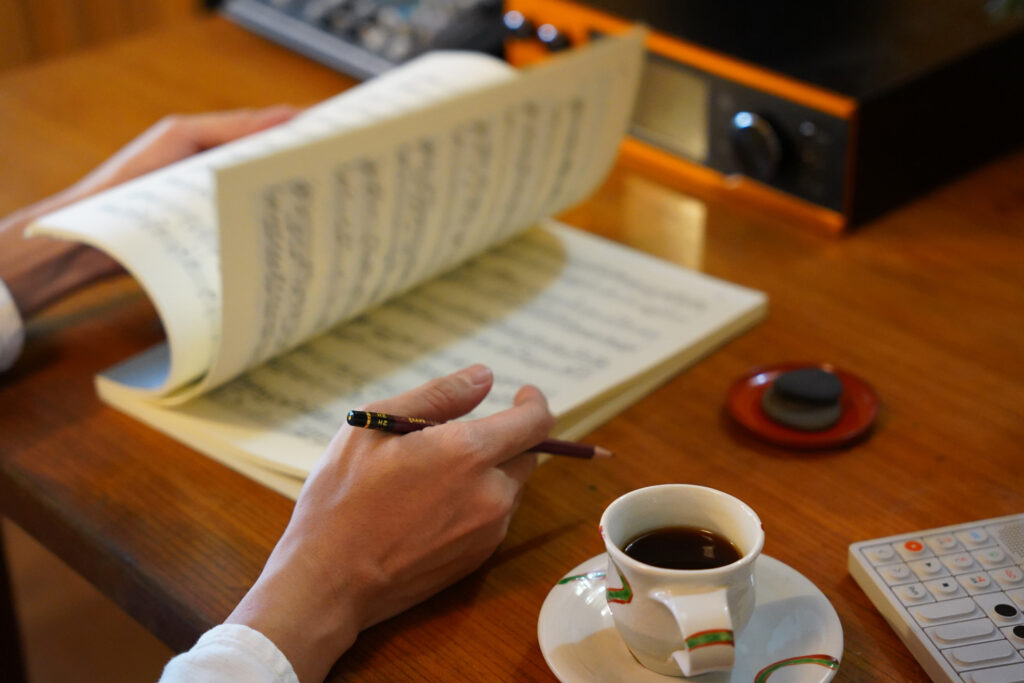
This is an excerpt from a conversation with Mr. Taro regarding "Gagaku" and "traditional music." Please enjoy these anecdotes, which may or may not be related to Gagaku, and the topics that arose during our lively discussion.
Me (Aoyagi): Did you make any new discoveries while working on the soundtrack for SHOGUN?
Taro: I was really happy, but also a bit surprised, when world-renowned composers like Atticus and others praised it so highly, calling it "great" and "magical."
Me: When we listen to Gagaku, we often feel a sense of sacredness. Do you think people from other countries feel the same way?
Taro: It's interesting because people react in different ways. There was this one time when Atticus actually emailed me directly, which was rare. He said, "I'm in the editing room. There's a scene with Sanada, and when the hichiriki (a traditional Japanese wind instrument) played, one of the staff members laughed. Taro, is this supposed to be funny?" I replied, "No, not at all. If you think it's cool, just stick with that." Later, I shared this story with a hichiriki player, and they said, "With Gagaku, some people laugh, while others cry, even during the same performance."
Me: That makes sense. For us Japanese, the idea of Gagaku being "sacred" may come from our preconceptions, so we tend to interpret it as holy. On the other hand, people from other cultures might be listening with a more neutral perspective.
Taro: Exactly. The hichiriki player also mentioned that children often have mixed reactions—half of them are impressed, and the other half burst into laughter. And as a performer, they said it's okay for people to laugh.
Me: That’s something you don’t see with many other instruments.
Taro: It’s kind of like the way we perceive gods. When I watched the Takachiho Kagura (a traditional Japanese dance ritual), I realized that even the gods can be playful or angry. They're not just sacred and serious all the time.
Me: So Gagaku, too, isn't just about sacredness; it has many different expressions, right? It has a wide range of emotions.
Is there a particular scene in SHOGUN where Gagaku, used as part of the soundtrack, left a strong impression on you?
Taro: I always approach composition with the same mindset. I put the same amount of effort into every piece, so I can’t really say that any one scene stands out more than the others. However, one unique aspect of this project was that when I received sketches from the U.S., I immediately thought about using traditional Japanese instruments like the shakuhachi (bamboo flute). I wanted to let those sounds resonate clearly, so I wrote the simplest and best phrases I could think of.
Me: So you really brought out the individual character of the instruments and their natural strengths.
Taro: Yes, and Atticus and the others called it "great."
Me: Now I'm even more curious about the unique qualities and strengths of each instrument! You also incorporated shōmyō (Buddhist chant) into the soundtrack. There are moments where you’ve taken a single chant and looped it—something that’s quite unusual in Japan. The way you and Atticus blended your ideas really created something special. It’s a true collaboration between Japan and the U.S.
Taro: Absolutely!

In the future, we will dive even deeper into the allure of Gagaku and the traditional instruments that have captivated people across time and cultures. Stay tuned!
Written by Atsuko Aoyagi / ao.Inc.
#DailyThoughts #JapaneseTraditionalMusic #Composition
#Gagaku #ComposingGagaku #NonMusic #GagakuPerformance
#FilmMusic #CinematicMusic #SpatialMusic #GagakuStories #SideNotes
#WhyIs #Gagaku #Layer #AndMysterious